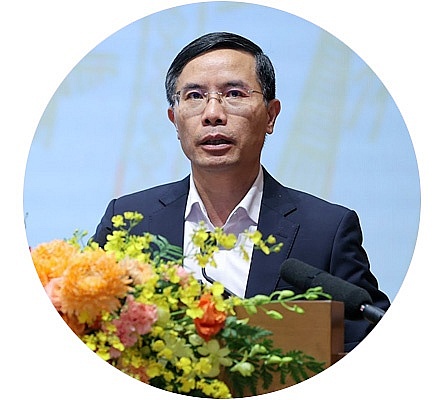Credit quality rise heads up business help
 |
| PM Pham Minh Chinh (middle) made clear the priorities on boosting credit and business performance, photo Nhạt Bac |
Prime Minister Pham Minh Chinh last week directed the State Bank of Vietnam (SBV) to implement new and feasible solutions to increase ability in access to capital and credit, especially for small- and medium-sized enterprises.
“It is necessary to remove legal obstructions and improve credit quality; and to closely increase coordination between the state, banks, and enterprises, as well as raise the management capacity of banks and the financial market,” PM Chinh requested. “Besides that, it is a big need to increase transparency in deposit interest rates, loan provisions, and fight against black credit; while also strengthening supervision and prevention of risks, corruption, and negative activity.”
PM Chinh also ordered the banking system to reduce lending rates and operational and transaction costs. “We need to continue truncating administrative procedures and vexations, as well as interest groups,” he stressed. “The banking industry has to make new breakthroughs in digitalisation, quality of services and human resources, infrastructure, business, employment, and livelihoods as well.”
The prime minister’s direction came amid the economy showing signals of recovery, but enterprises are still struggling, in part due to a lack of bank loan access. In Vietnam, enterprises’ capital mostly comes from commercial banks.
The PM had already met with leaders of banks several months ago to discuss solutions to assist enterprises. Early this month, he released details on monitoring credit growth for 2024.
In early 2023, based on economic growth and inflation goals for the year, a credit growth rate was set at 14-15 per cent. However, the SBV reported that the achieved rate for the entire year sat at 13.78 per cent as compared to the end of 2022. In the first two months of this year, the rate reduced 0.72 per cent against the end of 2023.
According to the SBV, credit growth has decreased in almost all sectors. In the first two months of 2024, only the property and securities sectors saw a rise as compared to the end of 2023, at 0.23 and 2.56 per cent, respectively.
The SBV ascribed the two-month credit decrease to various reasons. “The first reason is the world economy becoming increasingly complicated with high pressures in inflation and interest rates. There have also been complex developments in the world’s gold prices and USD,” said SBV Deputy Governor Dao Minh Tu. “These unfavourable factors have had negative impacts on the stability of the VND/USD exchange rate in the domestic market.”
Currently, the economy’s demand for capital and absorbability of capital remain at a low level. “Many enterprises have had to narrow down performance due to high inflation and a rise in material prices, as well as a lack of orders,” Tu said. “That’s why they have no demand for bank loans, and even have had to tighten their belts.”
Though a number of enterprises still need capital, they fail to meet borrowing conditions, especially those operating on a small scale with limited capacity and a lack of feasible business plans, Tu added.
However, he also noted that the reduction of credit growth has slowed down, standing at -0.05 per cent in February from -0.6 per cent in January. “With abundant liquidity, and large room remaining for credit expansions, credit institutions are now in a good position to provide more capital for the economy,” Tu said.
The government has set a target of 15 per cent growth in credit this year, and the SBV said it will implement various solutions to boost credit in the economy.
“We will direct credit institutions to boost credits in a safe, effective, and targeted manners, with loans set to be provided for production and business sectors, prioritised sectors and economic growth drivers,” said an SBV report submitted to the government last week. “We will also continue reviewing and simplifying procedures and borrowing dossiers, as well as collaterals, making it more favourable for businesses and the public to access to bank loans.”
| Stability at heart of progress
In recent times, the government’s policies have been very specific, bringing positive effects to businesses. Last year, Sun Group welcomed five million visitors to the Ba Den Mountain tourist area in Tay Ninh province. This year, we expect to welcome seven million visitors or more, thanks to new visa policies and other liberal moves. Thanks to the government’s managing of monetary policy, we expect positive impacts in reducing lending rates, assigning credit limits, and declining risk coefficients of loans that enable commercial banks to have more room to support social housing policies, industrial property projects, and our production and business activities. However, to accelerate growth and stabilise the macroeconomy, Sun Group raises some suggestions that the government and the State Bank of Vietnam (SBV) continue to provide policies to maintain macroeconomic stability as well as stabilise deposits and lending interest rates. Public investment should be strengthened further, especially in infrastructure, and large and reputable enterprises should be facilitated and welcomed to participate in key national projects. Moreover, regarding current and future policies to support businesses in the economy, we recommend the government provide synchronous guidance and explanation from the central to localities, all businesses, and banks so that these policies are realised as quickly as possible to generate values for society. Many real estate businesses are waiting for access to lower-cost credit capital. Specifically, the current difference between loans in joint stock commercial banks and state-owned commercial banks is considerable. All businesses want to narrow this gap and borrowing costs will be further reduced for businesses to easily recover. | ||
| Debt restructuring should enable independent decisions
Due to the nature of operations, typically the difficulties faced by borrowers will lead to challenges for lenders, albeit with a delay compared to businesses. This has been evidenced by the fact that non-performing loans (NPL) increased from 2.03 per cent at the end of 2022 to 4.55 per cent at the end of 2023. Given the current challenging circumstances for businesses, failure to continue appropriate debt restructuring will undoubtedly lead to further increased NPLs. Thus, the pressure regarding NPLs and declining profits due to risk provisioning is substantial. The SBV has addressed this issue, emphasising that debt restructuring should allow commercial banks to base decisions on the capabilities and cash flows of customers. A current reality is the intense competition among commercial banks, offering very low interest rates for new loans to attract quality customers, and even lending to repay debts at other banks. Consequently, businesses are shifting their borrowing from one bank to another, or converting old debts into new ones with lower interest rates. This also explains the situation where despite an increase in loan disbursements, outstanding loans continue to decrease. Presently, some businesses are borrowing at rates lower than deposit rates, and it’s not uncommon for businesses to borrow from one bank to deposit funds into another. Although the macroeconomic results of the past two months have shown bright spots, the ongoing complex and unpredictable global situation means that difficulties in exports are unlikely to improve significantly in the coming months. Therefore, the fundamental driving force for growth remains addressing internal issues, as identified through meetings of the prime minister, deputy prime ministers, and various ministries, focusing on public investment and fiscal policies to stimulate production and business activities. Furthermore, it is expected that as incomes increase, it will reduce defensive psychology, stimulate consumption, thereby increasing demand for new credit. | ||
| All sides determined to remove obstacles
For a long time, credit institutions have united and supported Becamex and its ecosystem, contributing to our success and efforts to overcome difficulties in recent years. Accessing credit is not difficult for us. A difficulty that many real estate businesses encounter, including Becamex, is plans related to bond issuance because infrastructure developers need considerable capital. However, issuance plans, usage plans, and debt repayment schemes of these businesses have often been lengthy, affecting their debt repayment plans, and leading to negative impacts on loans. When Becamex implemented projects across the country, there were more delays than before due to long legal procedures, cash flow, and issues with debt repayment plans. But the prime minister and ministries have removed many obstacles for businesses, especially real estate developers, and their instructions are spreading to all localities. But the last step is the most decisive one, which involves completed procedures between the bank and businesses. Credit is not too difficult, but businesses’ legal requirements are not good enough. In the time coming, Becamex is developing an ecosystem of renewable energy and green industrial parks. We hope banks will provide new policies and new credit packages for businesses to grasp, to be a basis for building and accessing the best credit capital. | ||
| Consideration of exemptions needed
HDBank closely follows and implements programmes for lending in line with the orientations of the government and the SBV for economic development and ensure the livelihoods of businesses and individuals. For example, the government and the SBV’s direction for a $208.33 million package focused on disbursing funds for rice and paddy procurement activities as the Mekong Delta enters the harvest season. Alongside this, disbursing funds for processing industries, construction, logistics, agriculture, subcontracting, and household lending totals nearly $500 million. There is also a need for implementing debt restructuring, deploying preferential packages for retail chains, continuing to enhance connectivity between banks and businesses, and sponsoring consumer demand. HDBank proposes, firstly, that credit growth should be accompanied by consideration of financial policies, exemptions, extensions of taxes, fees, and land rents to support individuals and businesses; and by adjusting personal income tax rates to stimulate consumption. Secondly, we suggest that relevant authorities along with the banking sector should vigorously implement measures to streamline licensing procedures for businesses implementing projects in real estate, manufacturing and trading sectors, creating jobs and thereby supporting credit disbursement. Next, it is necessary to restore confidence for the corporate bond market to develop, alongside bank funding for projects with long-term and sustainable capital. Support should also be provided for lending in rural and agricultural development, women, and startups, and relaxations in regulations on collateral for debt repayment. The banking sector is where comprehensive economic activities are concentrated. Therefore, all other economic sectors should gather under organisations between industries. Under the guidance and direction of the government and the SBV, I believe we will succeed. | ||
| Capital support can help turn aviation around
Vietnam Airlines is gradually resuming production and business activities. In 2023, the aviation industry’s recovery was still struggling. However, thanks to the government’s support like the visa policy, we have already recovered about 80-90 per cent compared to before the pandemic. Based on that support, Vietnam Airlines is also very determined to achieve its set goals by improving service quality and absolute safety. We are still expanding production and business, re-opening old routes and launching new routes, especially transcontinental ones. However, the aviation industry is also greatly affected by political issues, especially in the Middle East and Ukraine, causing costs to increase very high. Nevertheless, we will strive to expand our flight segment, balance revenue and expenditure, or approach the balance by the end of 2024. Vietnam Airlines has some recommendations regarding monetary policy. Lending rates are still high and very difficult to access. We hope to be supported by lower rates, especially medium and long-term ones. For exchange rates, in the airline industry, a 1 per cent change in exchange rate costs $12.5 million. If it changes by 5 per cent, the cost raised by $62.5 million per year. The stable exchange rate at the low level is crucial for us. We propose the SBV direct banks to increase credit limits for us. We hope that the government and the SBV will ask financial institutions to support us in raising capital. | ||
| Hopes for optimal interest rate policies
We highly appreciate the management of monetary and credit policies that have ensured stable interest rates, inflation and exchange rates, enabling large enterprises like PetroVietnam to be stable and achieve some good results. Our consolidated credit is about $10 billion. If interest rates increase by 1 per cent, the group’s capital costs will increase by about $100 million per year. Therefore, restructuring capital and finance in projects of PetroVietnam is vital to cut down the average cost of capital in each project. For example, restructuring loans from credit institutions and banks around the world for the Nghi Son Refinery and Petrochemical Plant project. At present, PetroVietnam is negotiating with banks to restructure these loans with new loans with lower average capital costs to optimise the group’s production and business costs and overcome difficulties. According to the 2021-2025 plan, we plan to mobilise about $10.4 billion from credit for development investment. So we hope that the government and the SBV continue to maintain optimal and stable interest rate policies to maintain the production, business and investment activities of the group. PetroVietnam’s current foreign currency loan balance is $1.58 billion, so exchange rate fluctuations and risks greatly affect the production and business activities of the group, especially in risk management following exchange rate fluctuations. Fortunately, the SBV has been controlling the exchange rate stably, enabling businesses to minimise the impact of the fluctuations. In terms of lending policy, our ventures are considerable in scale with large loan amounts such as the $5-billion Nghi Son refinery. If lending policy and support from local credit institutions get clear, especially in the four major state-owned commercial banks, the capacity of credit will improve substantially. Therefore, if raising the loan cap for each case, or for the entire complex of big corporations, it is possible to support these credit institutions, large enterprises, and massive projects to access and use domestic credit sources. | ||
| Growth drivers will rebound
Credit balances in the first two months of the year decreased by 0.72 per cent compared to the end of 2023, which is not overly concerning as it aligns with market trends and issues that can be rectified to achieve the 15 per cent credit growth target. Specifically, credit supply factors, including several key issues such as proactive and flexible monetary policies to stimulate credit growth by the SBV, have been effective. Liquidity in the system is ample. Additionally, the SBV has set credit growth targets for the entire year, and deposits and sources of funding for credit institutions are substantial. Meanwhile, interest rates have continuously decreased since the second half of 2023, and it is expected to remain low throughout 2024. Credit institutions are striving to provide loans to achieve business results. However, there are three limiting factors affecting credit supply. The increase in NPLs affects individual credit institutions and the entire system; the issue of customers borrowing from multiple banks makes it difficult for credit institutions to control cash flows; and asset values have declined, with the consequences of lending without recovering debts significant. Looking at the demand side, there are four fundamental factors supporting demand. The decrease in credit demand in the first two months of the year is mainly cyclical due to the Lunar New Year and business culture. This is the main reason for the decrease in outstanding loans in the first two months compared to the end of last year. Additionally, the macroeconomic situation has continuously improved, showing a positive trend, despite a decline in February, but overall, the first two months were very positive. With this trend, the GDP growth target (6-6.5 per cent) and inflation (3.5-4 per cent) will be achieved, growth drivers will recover, and credit demand will increase rapidly. Notably, improvements in consumer demand and exports are positive, both domestically and internationally. Public investment disbursement will be accelerated; the labour market and real estate market are gradually recovering, with clearer forecasts from the second quarter onwards, thereby stimulating credit demand. | ||
| Deserving of a separate law to handle bad debts
It is necessary to revisit which driving forces growth depends on. The first aspect is public investment – we have done a lot in this regard, as well as supporting large enterprises and simultaneously promoting exports, international relations, diplomacy, and multilateralism. However, there is an area where we have not carried out much yet, which is stimulating domestic consumption. This issue has been mentioned, but is not yet effectively addressed. There should be a government programme specifically addressing domestic consumption as a major issue. Secondly, there is excess money in banks, and tens of trillions are idle. If we say that banks don't want to lend, that's not correct. Banks do want to lend, but under what conditions? VPBank has more than 40,000 enterprises, with a credit limit of $10 trillion, but currently, only over $2.5 trillion has been disbursed due to various reasons. These are businesses that meet standards but lack outlets and production plans. Therefore, the state needs a separate initiative to support through fiscal policies, as credit policies alone are not enough. The third aspect is the issue of interest rates. The government, the SBV, and businesses also want lower interest rates. This is very reasonable, but reducing rates depends on many factors. Interest rates have decreased significantly, but there is another crucial factor, which is procedures and associated costs that cannot be reduced. Finally, bad or unprofitable debts are an area that will exist indefinitely alongside banks and the economy, so it needs to be addressed. Handling bad debts should be a matter of extreme concern for the state, and it deserves a separate law to address bad debts. In practice, banks encounter more and more difficulties in dealing with debts, not only unrecoverable debts but also increasing costs and capital. And while waiting for a separate Code to handle bad debts, the State should extend Resolution 42, which expired last December. |
What the stars mean:
★ Poor ★ ★ Promising ★★★ Good ★★★★ Very good ★★★★★ Exceptional
Related Contents
Latest News
More News
- Masan Consumer names new deputy CEO to drive foods and beverages growth (February 23, 2026 | 20:52)
- Myriad risks ahead, but ones Vietnam can confront (February 20, 2026 | 15:02)
- Vietnam making the leap into AI and semiconductors (February 20, 2026 | 09:37)
- Funding must be activated for semiconductor success (February 20, 2026 | 09:20)
- Resilience as new benchmark for smarter infrastructure (February 19, 2026 | 20:35)
- A golden time to shine within ASEAN (February 19, 2026 | 20:22)
- Vietnam’s pivotal year for advancing sustainability (February 19, 2026 | 08:44)
- Strengthening the core role of industry and trade (February 19, 2026 | 08:35)
- Future orientations for healthcare improvements (February 19, 2026 | 08:29)
- Infrastructure orientations suitable for a new chapter (February 19, 2026 | 08:15)









 Tag:
Tag:

















 Mobile Version
Mobile Version